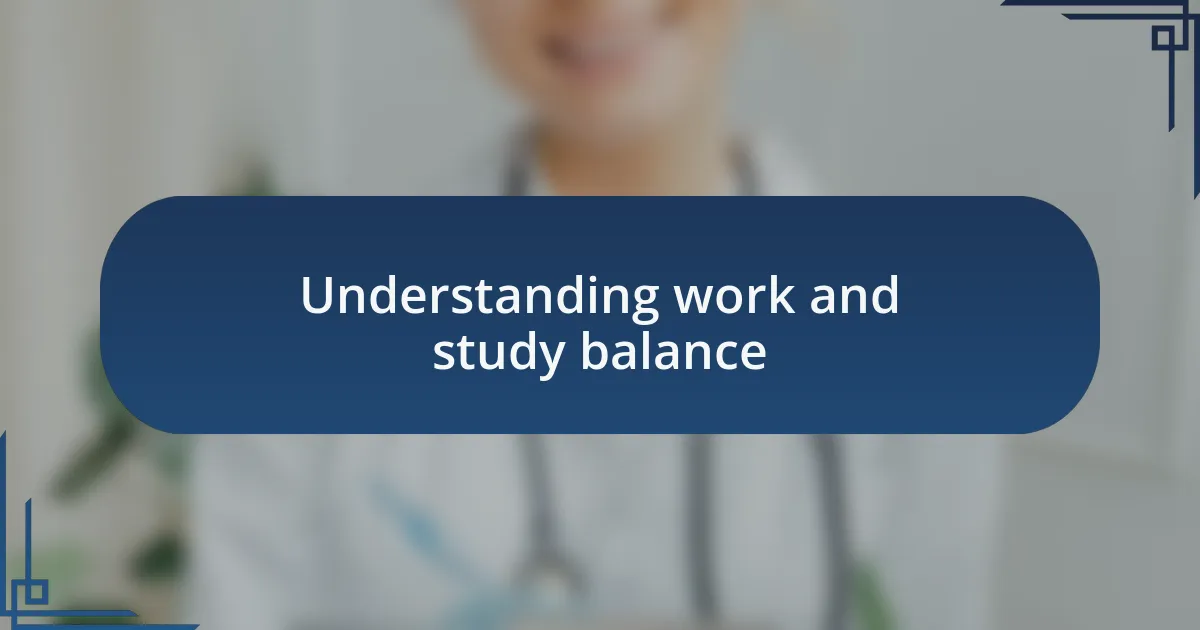Key takeaways:
- Effective time management and setting realistic goals are crucial for balancing work and study, particularly in healthcare education.
- Creating a detailed weekly planner and setting strict boundaries can help maintain focus and reduce distractions during study sessions.
- Prioritizing tasks based on urgency and personal interest significantly enhances productivity and motivation.
- Seeking support from peers and mentors is essential when feeling overwhelmed, reinforcing the value of community in overcoming challenges.

Understanding work and study balance
Balancing work and study is often like walking a tightrope; one wrong step and it can feel overwhelming. I remember a time when I was juggling night shifts at the hospital while studying for my nursing exams. The exhaustion was real, but I learned that effective time management and prioritizing tasks made a significant difference in my ability to perform well in both areas.
Think about it: have you ever felt that twinge of anxiety right before an important deadline? I certainly have. In those moments, I realized the importance of setting realistic goals and being kind to myself. It’s easy to fall into the trap of over-committing, but giving yourself grace allows you to recharge and tackle your responsibilities with a clearer mind.
Ultimately, finding that balance is a journey, not a destination. I often reflect on how small habits, like scheduling my study sessions and work shifts mindfully, minimized stress. If you’re feeling uncertain, remember that it’s perfectly normal to seek support from peers or mentors along the way. After all, navigating this dual responsibility is a challenge we all share, and learning from each other’s experiences can provide valuable insights.

Strategies for effective time management
One of the most effective strategies I adopted was creating a detailed weekly planner. I remember one particularly intense week when blending shifts and studies left me feeling scattered. By writing down my obligations and allocating specific time slots for study, I found a structure that turned chaos into clarity. Have you ever marked off time for yourself just to see it disappear? Taking ownership of my time allowed me to feel more in control of both my academic and professional commitments.
Setting strict boundaries was another game-changer for me. There was a time when I used to answer work emails while trying to study, and it quickly became an unbearable distraction. I decided to have designated times where my phone went away during study sessions. This meant I could focus deeply. Can you recall moments when you felt completely absorbed in your study? Those bursts of concentration felt productive and rewarding, leading to much better retention of information.
Finally, embracing flexibility played a crucial role in my time management. When unforeseen circumstances arose—like an unexpected shift or personal issue—I learned to adapt. Instead of beating myself up over missed study hours, I’d reassess my priorities and adjust my schedule. Isn’t it freeing to realize that sometimes we need to pivot? I found that by staying open to change, I was able to maintain a healthier balance, helping me to thrive in both my studies and work.

Prioritizing tasks in healthcare education
When it comes to prioritizing tasks in healthcare education, I learned early on that not all responsibilities hold the same weight. During my first semester, I found myself drowning in assignments that felt equally urgent. However, I soon realized that focusing on upcoming exams gave me the most significant return on my effort. Have you ever felt the relief that comes with prioritizing one task over the others? That sense of clarity can be liberating.
One strategy that worked wonders for me was mixing short-term and long-term goals. For instance, I often set a daily goal to complete assignments while keeping an eye on larger projects that were due weeks later. By breaking down daunting tasks into smaller, manageable pieces, I could celebrate small wins along the way. Do you remember how uplifting it felt to check off even the smallest task? These little victories kept my motivation afloat during tough weeks.
Additionally, I found it helpful to rank tasks based on deadlines and personal interest. There were subjects I was passionate about that fueled my desire to work harder. Reading about new healthcare protocols was thrilling for me. In contrast, I would often push less engaging tasks down my list. But isn’t it amazing how aligning passion with priorities can transform your productivity? By doing so, I found myself more invested, turning mundane tasks into stepping stones toward my ultimate goals.

Personal experiences in managing both
Managing both work and study in healthcare education has been a balancing act for me, often requiring some tough choices. I vividly recall nights spent in the library studying while balancing my shifts at a local clinic. It was exhausting, but I found that my experiences at work provided real-life context to what I was learning, making those late hours more worthwhile.
One memorable instance was during a particularly heavy week when a major project and a work shift coincided. I had to choose between pulling an all-nighter or breaking my study into smaller, focused intervals while on breaks at work. I opted for the latter. That decision not only reinforced my understanding of time management but also highlighted how crucial it is to adapt when circumstances demand it. Have you ever felt that rush of solving a problem on the spot? I found that in those moments, the connection between theory and practice became clearer.
There were definitely moments of doubt, especially when deadlines loomed or shifts ran late. I remember feeling like I was stretched too thin one week when everything seemed to collide. It was during those times I learned the importance of seeking help. I reached out to a mentor who reminded me that it’s okay to lean on others. That support helped me navigate through the chaos and reinforced my belief in the community we build within our field. Who would have thought that sharing my struggles could lighten my load?